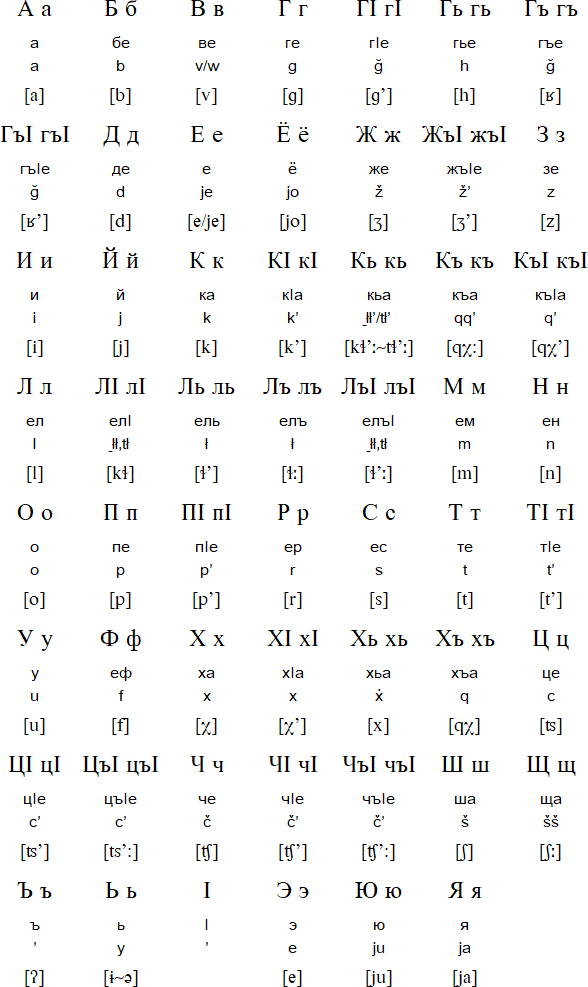Andi is member of the Avar-Andic branch of the Northeast Caucasian language family. It is spoken in the Botlikhsky district of the republic of Dagestan in the Russian Federation. In 2010 there were about 5,800 speakers of Andi, which is also known as Andii, Andiy, Khivannal, Qandisel or Qwannab.
The Andis (khivannal) live mainly in nine villages: Andi, Gunha, Gagatl, Rikvani, Chakhno, Zilo, Munib and Kvanhidatl, in the mountains of northwestern Dagestan.
Andi is rarely written and Andi speakers generally write in Avar or Russian. Two issues of a newspaper in Andi were published in the 1990s, and the first book in Andi, a translation of the Gospel of Luke, was published in 2015. A primer in Andi was published in 2018 using the alphabet below.

Information provided by Wolfram Siegel
Download an alphabet chart for Andi (Excel)
Source: Иса Авараги игьир. The Birth of Jesus Christ in Andi language. Moscow 2000.
Supplied by Wolfgang Kuhl
Translation supplied by Michael Peter Füstumum
Information about Andi | Numbers
Information about Andi language and people
http://en.wikipedia.org/wiki/Andi_language
https://ru.wikipedia.org/wiki/Андийский_язык
http://www.ethnologue.com/language/ani
http://www.eki.ee/books/redbook/andis.shtml
http://www.philology.ru/linguistics4/alekseev-99b.htm
Aghul, Akhvakh, Andi, Archi, Avar, Bagvalal, Batsbi, Bezhta, Botlikh, Budukh, Caucasian Albanian, Chamalal, Chechen, Dargwa, Godoberi, Hinukh, Hunzib, Ingush, Kaitag, Karata, Khinalug, Khwarshi, Kryts, Kubachi, Lak, Lezgian, Rutul, Tabassaran, Tindi, Tsakhur, Tsez, Udi
Abaza, Abkhaz, Adyghe, Aghul, Akhvakh, Akkala Sámi, Aleut, Altay, Alyutor, Andi, Archi, Assyrian / Neo-Assyrian, Avar, Azeri, Bagvalal, Balkar, Bashkir, Belarusian, Bezhta, Bosnian, Botlikh, Budukh, Bulgarian, Buryat, Chamalal, Chechen, Chelkan, Chukchi, Chulym, Chuvash, Crimean Tatar, Dargwa, Daur, Dolgan, Dungan, Enets, Erzya, Even, Evenki, Gagauz, Godoberi, Hinukh, Hunzib, Ingush, Interslavic, Itelmen, Juhuri, Kabardian, Kaitag, Kalderash Romani, Kalmyk, Karaim, Karakalpak, Karata, Karelian, Kazakh, Ket, Khakas, Khanty, Khinalug, Khorasani Turkic, Khwarshi, Kildin Sámi, Kili, Komi, Koryak, Krymchak, Kryts, Kubachi, Kumandy, Kumyk, Kurdish, Kyrgyz, Lak, Lezgi, Lingua Franca Nova, Lithuanian, Ludic, Macedonian, Mansi, Mari, Moksha, Moldovan, Mongolian, Montenegrin, Nanai, Negidal, Nenets, Nganasan, Nivkh, Nogai, Old Church Slavonic, Oroch, Orok, Ossetian, Pontic Greek, Romanian, Rushani, Russian, Rusyn, Rutul, Selkup, Serbian, Shor, Shughni, Siberian Tatar, Sirenik, Slovio, Soyot, Tabassaran, Tajik, Talysh, Tat, Tatar, Teleut, Ter Sámi, Tindi, Tofa, Tsakhur, Tsez, Turkmen, Tuvan, Ubykh, Udege, Udi, Udmurt, Ukrainian, Ulch, Urum, Uyghur, Uzbek, Veps, Votic, Wakhi, West Polesian, Xibe, Yaghnobi, Yakut, Yazghulami, Yukaghir (Northern / Tundra), Yukaghir (Southern / Kolyma), Yupik (Central Siberian)
Languages written with the Latin alphabet
Page last modified: 18.02.22
[top]
You can support this site by Buying Me A Coffee, and if you like what you see on this page, you can use the buttons below to share it with people you know.

If you like this site and find it useful, you can support it by making a donation via PayPal or Patreon, or by contributing in other ways. Omniglot is how I make my living.
Note: all links on this site to Amazon.com, Amazon.co.uk
and Amazon.fr
are affiliate links. This means I earn a commission if you click on any of them and buy something. So by clicking on these links you can help to support this site.
[top]